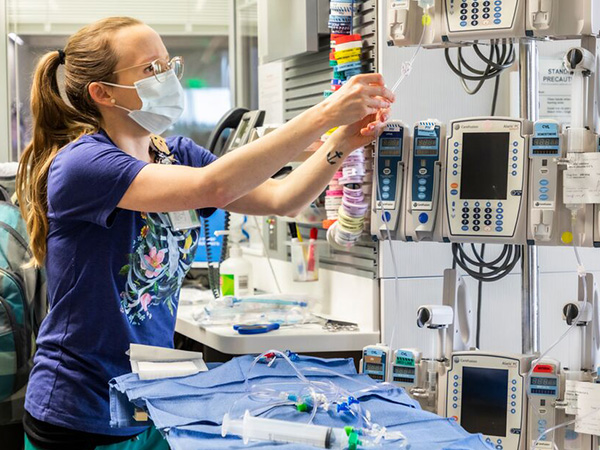Healthy Work Environment
Staying Safe: A Trauma-Informed Approach to Preventing Workplace Violence
Our work environment plays a large role in our job satisfaction and longevity in a position. One of the five core elements of Seattle Children’s nursing professional practice model is a healthy work environment, described as one in which we “advocate for the well-being of the mind, body and spirit for ourselves, our colleagues and our patients and families, both at the point of care and in the broader community, by creating healthy, caring environments.”
Part of ensuring a healthy work environment for nurses includes providing training so that team members have a shared knowledge base and skills to de-escalate interactions. A foundational principle is trauma-informed care, which encompasses a universal expectation that everyone we come into contact with has experienced a traumatic event. Moreover, trauma-informed care is a commitment to not repeat these experiences and — in whatever way possible — to restore a sense of safety, power and worth to the individual.
A common request from the nursing workforce is for training in de-escalation, evasion and conflict resolution. As a part of Seattle Children’s commitment to health equity and anti-racism, the Workplace Violence Prevention e-learning was revised. The resulting 8-hour course Safe & Healthy Work Environment is an in-person offering that is required for inpatient nursing workforce members and nursing leaders. Course activities explore interpersonal bias during conflict management and present deeper training about activation of the behavioral response system (i.e., Adaptive Social Response) in our ongoing efforts to improve health equity.
The training was developed by a multidisciplinary group consisting of members from Nursing Professional Development, Center for Diversity and Health Equity, Psychiatry and Behavioral Health, Security, Learning and nursing leaders who served as sponsors. The design team conducted a 6- month pilot testing process and obtained feedback from each inpatient unit’s clinical nurses and nurse leaders after they completed the training.
To receive continuing education credits, the learner must complete a survey and provide feedback on the course. Each month, the facilitator team reviews the learner surveys in one batch.
Continuous Improvement Strategies
From the surveys, we heard the need to amplify the value of resilience and add examples of conflict between nursing peers. As a result, we added two resilience activities and one scenario that described a conflict between two nurses. Other feedback related to the value of the OARS tool and the need to practice more scenarios, which led to more time devoted to the use of and practicing of OARS.
We are continuing to collect qualitative and quantitative feedback via the course survey. As of January 2023, 360 learners (including nurse leaders, clinical nurses and certified nursing assistants) have completed the course.
Comments gathered via the survey include:
“I learned how to approach an agitated person in a safe manner and what the most effective language is to communicate and connect.”
“I learned that conflict is an opportunity to learn more about a person, situation or relationship.”
Learn about this work and more in the 2022 Nursing Annual Report. (PDF)
Training in Bioethics: A Pilot Project for Nursing Leaders
Launched in 2022, the Nursing Leader Bioethics Scholars Program at Seattle Children’s is a collaborative pilot project involving the Division of Bioethics and Palliative Care and the Department of Nursing Practice, Professional Development and Innovation (NPPDI). This one-year program supports a nursing leader in obtaining expertise in bioethics.
Previously, a nurse who was interested in bioethics had to seek out coursework and perhaps apply to a graduate program or fellowship where the schedule might not be a good fit for someone working full time in a clinical setting. This program offers a nursing leader with an interest in bioethics the opportunity to attend academic courses and seminars for foundational knowledge. The nursing leader also participates in other clinical learning opportunities to further develop skills in supporting peers and frontline workforce members in discussions about ethical dilemmas encountered in clinical care.
Nurse leaders who are selected for the program:
- Engage in learning activities such as the weekly seminar within the Bioethics and the Palliative Care programs.
- Receive mentorship support from members of the Bioethics and Palliative Care team.
- Contribute as part of the planning committee for the inaugural nursing ethics pre-conference associated with the annual Pediatric Bioethics Conference.
- Participate in the online University of Washington Advanced Training in Healthcare Ethics (UW ATHE) certification program to gain foundational knowledge and skills in clinical ethics and ethics consultation.
- Have an opportunity to submit an abstract related to the program to the American Society for Bioethics and Humanities or other professional conference.
 Clinical Nurse Specialist Missy Lein commenced her year of training in the Scholar Program in fall 2022. Lein will integrate her learnings to support clinical nurses and nurse leaders across the organization to better understand the ethical principles and related decision making in the care of patients and families. She was excited for this opportunity to participate in the UW certificate program because she wanted a way to deepen her knowledge of ethical theory and practice plus develop skills to help workforce members navigate the ethical questions they frequently encounter.
Clinical Nurse Specialist Missy Lein commenced her year of training in the Scholar Program in fall 2022. Lein will integrate her learnings to support clinical nurses and nurse leaders across the organization to better understand the ethical principles and related decision making in the care of patients and families. She was excited for this opportunity to participate in the UW certificate program because she wanted a way to deepen her knowledge of ethical theory and practice plus develop skills to help workforce members navigate the ethical questions they frequently encounter.
“So far, my experience has illuminated the various approaches to ethical questions, both in theory and in practice,” Lein says of the program. “I’ve especially enjoyed learning from other students in the program who practice in different care settings such as adult critical care, palliative care and research. As I continue learning, I hope to be able to better support patients, families and care team members as we all navigate the ethical complexities inherent in our healthcare systems and within the intimate relationships of the patient/caregiver and healthcare professional.”
Bioethics is the interdisciplinary study of ethical, social, and legal issues that arise in the life sciences, healthcare, biomedicine and biomedical research, and policy related to these areas. Bioethics includes medical ethics, which focuses on issues in healthcare; research ethics, which focuses on issues in the conduct of research; environmental ethics, which focuses on issues pertaining to the relationship between human activities and the environment; and public health ethics, which addresses ethical issues in public health (NIH, 2022).
Learn about this work and more in the 2022 Nursing Annual Report. (PDF)
Working at Seattle Children’s
To reach our goals, we are committed to recruiting and retaining the best nurses. We invite you to search our current job openings.
Seattle Children’s provides opportunities for our nurses to learn and grow in an innovative environment while being in full partnership with other providers on multidisciplinary teams. We support and engage our nursing staff with training and educational opportunities, state-of-the-art-facilities and equipment, shared governance and comprehensive benefits.
When hiring, we look for nurses who share our passion for family-centered care and who practice at the top of their profession. Whether you are a new nursing graduate eager to participate in our healing environment, or a seasoned professional committed to advancing the practice of nursing, we welcome your application.
